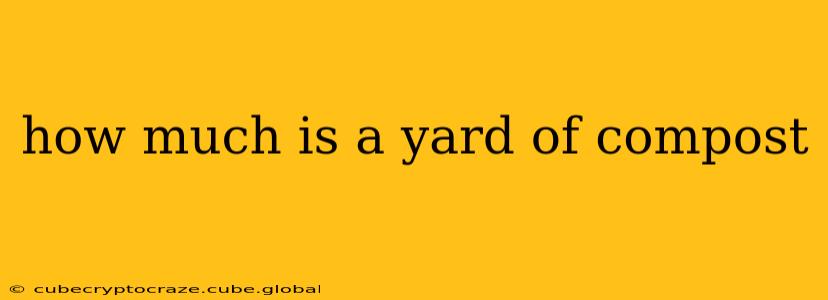How Much is a Yard of Compost? Understanding Compost Costs and Considerations
The price of a yard of compost varies significantly depending on several factors. There's no single answer to "how much is a yard of compost?", but understanding these factors will help you determine a realistic cost in your area. This guide will break down the pricing, helping you make informed decisions for your gardening or landscaping projects.
Factors Affecting Compost Price:
Several key factors influence the final cost of a yard of compost:
-
Type of Compost: The type of compost significantly impacts the price. Finished compost, ready for immediate use, is generally more expensive than raw or unfinished compost. Compost made from specific materials (e.g., mushroom compost, which is highly sought after by gardeners) can command a higher price. Consider the quality and ingredients when comparing prices.
-
Source: Purchasing compost from a large-scale commercial operation will usually be cheaper per yard than buying from a smaller, local supplier or a garden center. Local suppliers often offer higher-quality, locally sourced compost, but may charge a premium.
-
Delivery: Delivery fees can substantially increase the total cost. The distance the compost needs to travel, the quantity ordered, and the type of delivery (e.g., dump truck vs. smaller delivery) all affect the delivery charge. Some suppliers offer free delivery for larger orders.
-
Location: Geographic location plays a role in pricing. Areas with higher demand or limited compost production may have higher prices.
-
Seasonality: Demand for compost often fluctuates seasonally. Prices might be slightly higher during peak gardening seasons (spring and fall).
How Much Does a Yard of Compost Typically Cost?
While a definitive price is impossible to give, a general range is helpful. You might find prices ranging from $20 to $80 per cubic yard, but this can easily vary outside of this range depending on the factors mentioned above. It’s always best to get quotes from multiple suppliers in your area.
What are the Different Types of Compost?
Different types of compost offer varying nutrient profiles and qualities:
-
Finished Compost: This is fully decomposed organic matter, dark in color, and ready to use. It's usually more expensive but also more convenient.
-
Raw Compost: This is less decomposed and may contain larger pieces of organic material. It's usually cheaper but requires more time for decomposition in your garden.
-
Mushroom Compost: This specialty compost is prized for its high nutrient content and excellent drainage. It tends to be more expensive.
-
Leaf Mold: Made primarily from decomposed leaves, leaf mold is a light and airy compost ideal for improving soil structure.
Where Can I Buy Compost?
Several places offer compost for sale:
-
Local Garden Centers: These are often a convenient option but may have higher prices than larger suppliers.
-
Landscape Supply Companies: They often offer bulk discounts and delivery options for larger projects.
-
Commercial Compost Producers: These usually offer the lowest price per cubic yard, especially for large quantities, but delivery may be a considerable cost.
-
Municipalities: Some cities offer free or low-cost compost from municipal composting programs.
What is the Best Way to Determine the Price in My Area?
The best way to find out how much a yard of compost will cost in your specific location is to:
-
Contact local garden centers and landscaping supply companies. Request quotes for different quantities and types of compost, including delivery costs.
-
Check online marketplaces and classifieds. You might find individuals or smaller businesses selling compost at competitive prices.
-
Inquire about municipal composting programs. Your city or county might offer compost at a reduced cost or even for free.
By considering these factors and taking the time to compare prices from different suppliers, you can determine a realistic cost for a yard of compost in your area and choose the best option for your needs. Remember that while price is important, the quality and type of compost are equally crucial for a successful gardening or landscaping project.
